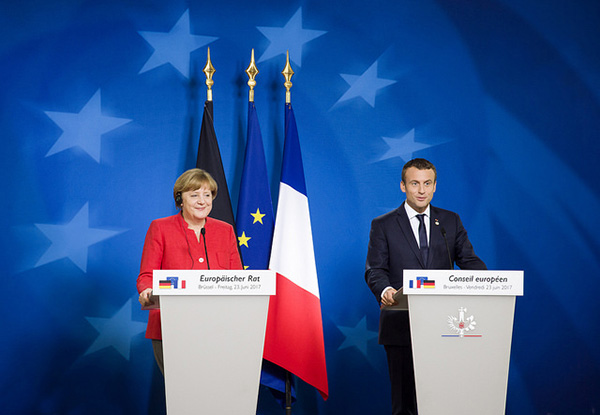
As things stand the only person who is en marche in the run-up to the elections for the European Parliament in May 2019, with a platform calling for considerably more Europe, is the French President Emmanuel Macron. He had hoped that Angela Merkel would accompany him on this journey, but the German Chancellor is trapped not only by the right in her own party –the CDU– but also by her Social Democrat coalition partners –who have lost their greatest europhile in the person of Martin Schulz– and an opposition in the Bundestag led by the eurosceptic AfD and some reluctant liberals.
Although he hopes to secure 20-30 MEPs and break the mould of the European Parliament to build a grand cross-party coalition in favour of more Europe, Macron is going to have his work cut out, even if he has the support of the European Commission. In the east, the Visegrád states and others are increasingly eurosceptic, opposed to a common immigration policy, more nationalist and some of them less democratic. In the north, a group of seven rich countries led by Mark Rutte of the Netherlands, no longer able to hide behind the British, places obstacles in the way of any developments that could involve transferring resources. And in the south, Italy has reverted to being eurosceptical and ungovernable. Portugal is staging a comeback. And there is a new opportunity for Spain, if it can only seize it, with its broad political and social consensus on Europe and a painful adjustment under its belt. Mariano Rajoy has the chance to clarify matters shortly when he visits the European Parliament.
Macron was bold, albeit rather vague, in his first appearance before the European Parliament. He highlighted democracy and a ‘reinvented’ concept of ‘European sovereignty’, ‘complementary rather than in replacement’ of national sovereignty. Whereas the word ‘sovereignty’ was used 23 times the term ‘federal’ was not used once, although arguably the idea was present in spirit. The French President talked about five dimensions, or pillars, of sovereignty for Europe: defence and internal and external security, economic and trade sovereignty, climate and energy sovereignty, health and food sovereignty, and digital sovereignty. It may be the last of these –and the issue of who controls our data, algorithms and artificial intelligence– that will end up procuring greater European unity. New taxes in this area could swell EU coffers, as Macron hopes, prepared as he is for France to contribute more to the EU if its budget is reformed, a battle that remains unresolved.
Just when talk has returned of the rebirth of the first dimension, involving defence, the surgical strike against Syria for the alleged use of chemical weapons by government forces has brought certain realities into stark relief. It was carried out by the US, partnered by France and the UK. With or without Brexit, the British are going to remain militarily important in the new Europe. Merkel’s Germany kept a low profile. And the EU-28 were incapable of lending their open support to the airstrike.
In terms of boosting the Eurozone, the proposals that Macron has been sketching out for months –guaranteeing bank deposits, the transformation of the European Stability Mechanism (ESM) into a European Monetary Fund (EMF), a meaningful budget for the zone, a European minister of finance and a convergence of corporate tax rates– are getting a chilly reception from Berlin and elsewhere. Olaf Scholz, the Social Democrat successor to the Christian Democrat Wolfgang Schäuble at the head of the powerful German Finance Ministry, has shown himself to be as sceptical as his predecessor. Neither the right of the CDU nor the Bavarian CSU want to convert the ESM into Macron’s EMF –Merkel wants the ESM to continue being intergovernmental, and it would require a slow and arduous reform of the treaties– or a significant shared budget for the Eurozone. The question is whether the Eurozone will be reformed beforehand, or if another crisis will be needed as a catalyst to reform. Merkel’s suggestion that the Eurogroup should include the economy and finance ministers would cause that organisation to balloon –‘jumbo’ is being used to describe it– without providing any clear added value. It seems to smack more of decoy than of substance.
Macron has won ground in the EU, although he will have to confirm it in the way he manages domestic reforms in his own country, resistance to which is proliferating. Following the long negotiations to form the coalition government, Merkel has lost some of her auctoritas. Underlying everything, however, in France and elsewhere, although not in Germany, is a widespread sense of fatigue with austerity. Macron wants more ‘solidarity’, Merkel more competitiveness, although this is something Macron also endorses. Should he not be advocating more solidarity for greater competitiveness?
As pointed out, ‘Macron has the ideas, but Merkel has the red pen’. Despite their internal and external problems, Macron and Merkel reiterated at their meeting in Berlin that they will submit a joint EU reform proposal, covering the Eurozone in particular, to the European Council in June. It is not the end of the Franco-German honeymoon, contrary to what some have claimed, because such a thing never existed, but rather the start of negotiations for a compromise, for what will undoubtedly be a meeting in the middle. The major European compromises between Germany and France have always involved mutual concessions rather than complete alignment. They now set out from the same premise: the Eurozone must be reformed. They disagree about how. In the Europe that exists today the Franco-German axis continues to be essential, but it is not the only one. And there is not really any alliance for more Europe. Perhaps the European elections of 2019 will serve to galvanise it and prevent the European Parliament becoming full of anti-Europeans.


